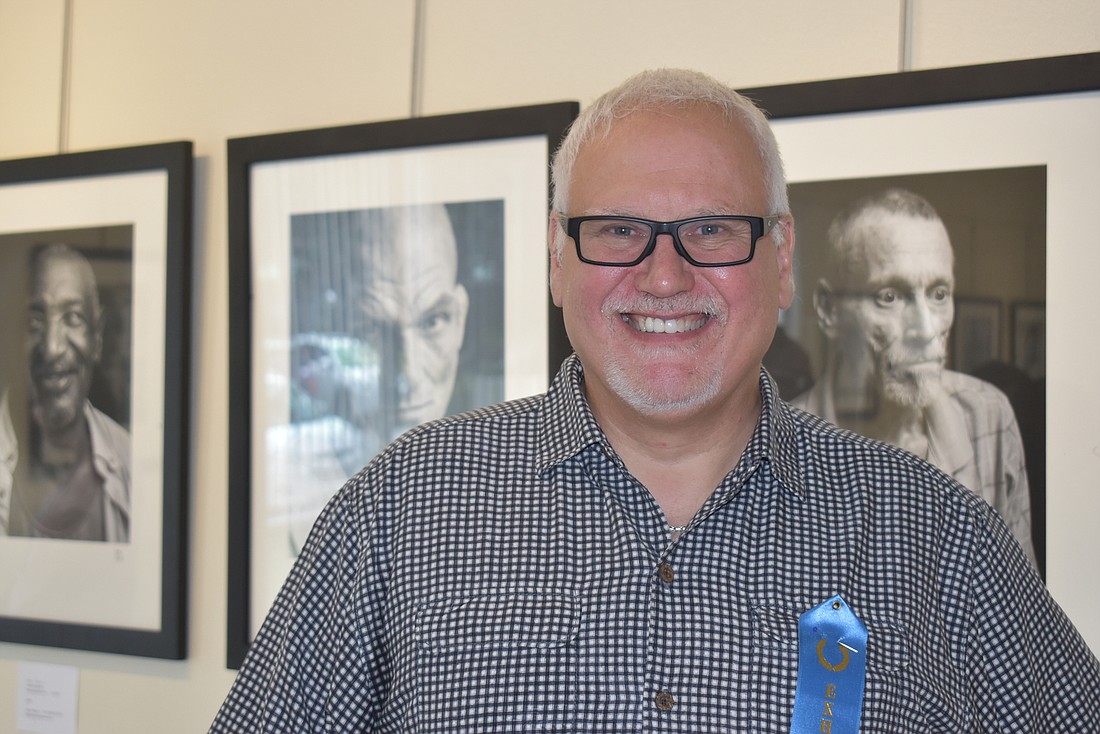- December 16, 2025
-
-
Loading

Loading

Longboat Key photographer Allan Mestel has managed to capture humanity in a flash of light.
Mestel, whose name you may recognize from his work around town or his gallery in Whitney Beach Plaza, held an exhibition of his project, “Homelessness in Focus,” at the Unitarian Universalist Church of Sarasota on Sunday.
The exhibit covered two and a half years of work, which blossomed from his encounters with the local food share organization Food Not Bombs. He began taking photos of people who live on the street while at the organization's food share events.
“I’m trying to find ways through my art to humanize homeless people,” Mestel said.
Mestel hopes people realize that homelessness is different from the common perception.
“It’s a big thing, and he’s got it right,” said Laura Licoski, who created local homelessness resources Home Is Where the Heart Is and Facing Homelessness, Bradenton. “He’s really captured it perfectly.”
Mestel attempted to create an “encounter experience,” where you feel like you’re looking eye-to-eye with the person in the photograph. This results in tightly cropped black-and-white portraits that are focused on the subject. This was Mestel’s goal, to get the viewer looking at the individual face to face so you can’t look away, he said. In this exhibit, you’re looking at a person you normally wouldn’t interact with in daily life.
“If you take the time to engage, you will not find what you think you will find,” Mestel said.
Sometimes people talk about a close-up portrait as being beautiful yet uncomfortable, like it made them want to look away but they couldn’t. Mestel’s portraits are the opposite of that. They draw you in with their humanity and when you finally do look away, it’s quite clear that though in different circumstances, the person pictured is just like you.
“They are a complete human being,” Mestel said. “They’re not different, they’re us.”
The portraits in this exhibit are amazingly shot, with the black and white throwing details like wrinkles in the face and mustache hairs into stark relief. Two photos show the same woman in two very different moods. One laughing, her face and joy filling up the frame. One pensive, sitting on a sidewalk somewhere.
“Whatever you’re seeing, that’s where she is at,” Mestel said. “I just let her be what she wanted to be.”
To put the spotlight on the subjects, Mestel tried to keep his energy in check, he said. Like taking care to keep a shadow out of a photo, he was very careful to keep himself and his personality out of the photos to focus on them. He wanted to stay on the knife's edge between candid and posed, where the shot looks almost designed but still unique to the person.
Some of the photos are from several weeks at the Freedom Gathering Church in Bradenton. Mestel went every Thursday, when Freedom Gathering founder Tonia Johnson and a team of volunteers serve home-cooked meals to the community. Mestel was able to set up a mobile studio in the back of the venue and take portrait shots of those willing to sit for him, according to a summary of the exhibit he had up. Part of the profits from the exhibit will go to Johnson and Freedom Gathering.
"They are our brothers and sisters and as deserving of our compassion and assistance as any other neighbor in need," Mestel wrote.
Homelessness is compounded by a few main factors, including mental illness, addiction and generational poverty. According to a 2015 study by the U.S. Department of Housing and Urban Development, 45 percent of people who are homeless have some sort of mental health issue. Caring for those people will require a lot of effort and changing conversations. There are no easy answers, Mestel said. But why shouldn’t we keep trying?
“The majority are humble souls, at the lowest point of their lives, doing whatever they can to survive,” Mestel said.
Mestel is from Toronto, where he first became interested in helping people facing homelessness while creating a film for United Way. There, he says, the population of people living on the street is cared for and there is a vast difference in how poverty is treated. An effort is being made, and there is less stigma attached to poverty and homelessness. In Sarasota, he’s seen a different story.
“Of all the wealth in this community, the number one thing people ask for is water,” Mestel said. “They can’t find water.”
Mestel’s work can be found in his gallery at 6842 Gulf of Mexico Drive.